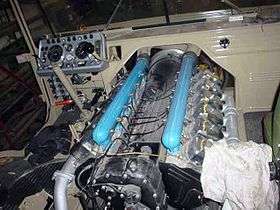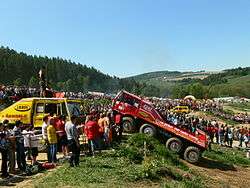Tatra 813
Tatra T813 was a truck produced in Czechoslovakia by the Tatra company. It was produced from 1959 to 1982.[1] The basic representative of this series was the a military version of the 8 × 8 Kolos (Colossus), which was able to pull trailers up to a total weight of 100 tons. Tatra also produced a civilian version in either 6×6 or 4×4. After fifteen years of production 11,751 vehicles were built in all modifications, most of which were exported - mainly to the USSR , East Germany , Romania and India .
| T 813 | |
|---|---|
 | |
| Overview | |
| Manufacturer | Tatra |
| Production | 1967-1982 |
| Body and chassis | |
| Class | Heavy Truck |
| Body style | COE |
| Powertrain | |
| Engine | V12 multifuel |
| Dimensions | |
| Length | 8,800 mm (346.5 in) (T813 KOLOS) |
| Width | 2,500 mm (98.4 in) |
| Height | 2,780 mm (109.4 in) (T813 KOLOS) |
| Curb weight | 14,000 kg (30,865 lb) (T813 KOLOS) |
| Chronology | |
| Predecessor | Tatra T141 |
| Successor | Tatra T815 |
| T 930-xx E | |
|---|---|
 | |
| Overview | |
| Manufacturer | Tatra |
| Also called | T 930 E |
| Combustion chamber | |
| Displacement | 17,640 cc |
| Cylinder bore | 120 mm (4.7 in) |
| Piston stroke | 130 mm (5.1 in) |
| Cylinder block alloy | Cast Iron |
| Cylinder head alloy | Aluminium alloy |
| Valvetrain | OHV |
| Compression ratio | 16.5:1 |
| Combustion | |
| Fuel system | Direct injection |
| Fuel type | Diesel fuel |
| Cooling system | Air-cooled |
| Output | |
| Power output | 198.6 kW (266 hp) @ 2000 rpm |
| Torque output | 990 N·m (730 ft·lbf) @ 1300 rpm |
| Dimensions | |
| Dry weight | 1,035 kg (2,282 lb) |
History
The first prototype already built in 1960 utilized existing Tatra T138 assemblies in 4x4 full-time all-wheel drive, which was also another first for Tatra. After the initial trials however the designers decided to develop and expand the concepts onto 8x8 all-wheel-drive all-terrain vehicle. The basis of the design thus became the modular chassis of T813. Successor is the Tatra T815 model.
Design and technology
The tubular backbone construction was once again selected. The main advantages of central load carrying backbone tube are in its high torsional and bending stiffness protecting the truck's body against load stresses. Another advantage is that it houses all important parts of the drive train as well as it enables a concept of modular construction where designers and customers can specify 4,6,8, wheel drive and various length wheelbase combinations. A new cab-over-engine design was implemented, as were the wide profile super single tyres and central tyre inflation/deflation system.
Engine
The naturally aspirated V12 engine T-930 was created by adding extra four cylinders to the existing T-928 75-degree V8 engine, used in Tatra T138. The crankshaft consisted of six individual journals bolted together with front and rear pins all running on the main roller bearings and located on axial friction thrust washers. The military version was once again multi-fuel capable, running on mixtures of diesel fuel, petrol and aviation kerosene fuel.
Chassis
The chassis is a full-length backbone tube with independent swing half axles in 4x4, 6x6 and 8x8. 4x4 models had front axle suspension via adjustable torsion bars, 6x6 and 8x8 models front and rear axles used longitudinal semi-elliptic leaf springs. For 4x4 configuration the rear axle was suspended via air suspension. Full-time all-wheel-drive front twin steer (6x6, 8x8) drive via homo-kinetic drive shafts, drive with the differential locks, inter-axle differentials with locks and planetary hub reductions on all models. Unlike many six-wheeled vehicles, which have a single front axle and tandem rear axles, 6x6 versions used twin steering front axles- as with the 8x8- and a single rear axle.
- Front track
- 2050 mm (KOLOS)
- 1990 mm (6x6 Hauler, S1, 8x8 Chassis)
- 2030 mm (NT, NTH Prime movers)
- Rear track
- 2000 mm (8x8 KOLOS)
- 1950 mm (6x6 Hauler, 8x8 Chassis, S 1)
- 1990 mm (NT, NTH Prime movers)
- Wheelbase
- T813 KOLOS - 1650+2200+1450 mm
- 6x6 Hauler - 1650+2700 mm
- 8x8 Chassis - 1650+3200+1450 mm
- S1 8x8 - 1650+2800+1450 mm
- NT, NTH 4x4 - 3700 mm
- Ground clearance
- 380 mm (KOLOS, 6x6 Hauler)
- 330 mm (8x8 Chassis, S1 8x8)
- 300 mm (NT, NTH Prime Movers)
Transmission
The main gearbox was located behind the cabin and connected to the engine clutch housing via a short cardan shaft (this design enables a so-called flat floor cabin.) The main gearbox was bolted to an auxiliary gearbox, to a transfer case and then to a backbone tube and formed main part of a chassis structure. Options for the rear power take off and or a winch drive were available. Main and auxiliary gears were fully synchronized except the first and reverse gear. The new feature was unique 2-speed planetary overdrive system bolted between front and rear axles. The overdrive could only be selected manually whilst stationary. Auxiliary gearbox had a neutral position which allowed a winch and a power take off to use main gearbox gearing for variable speed operation. The final drives used Tatra gear differentials with locks, offset drive shafts and planetary hub reductions.
- Main gearbox - 5+1 (2-5 gear synchronized) (KOLOS 8x8 & Hauler 6x6)
- gear ratios - (1)9.97, (2)4.96, (3)2.83, (4)1.68, (5)1.0, (R)8.58
- Main gearbox - 5+1 (2-5 gear synchronized) with splitter direct and overdrive (S1 8x8, Chassis 8x8,NT & NTH 4x4)
- gear ratios - (1)9.97, (2)4.96, (3)2.83, (4)1.68, (5)1.0, (R)8.58
- splitter ratios - 1.0 (Direct), 0.75 (Overdrive) (electro-pneumatic control via switch on the gear lever and clutch pedal activated )
- Auxiliary gearbox - 2-speed (electro-pneumatic control via switch on the gear lever and clutch pedal activated )
- gear ratios - 2.2, 1.62 (KOLOS & Hauler 6x6)
- Step down transfer case - single
- gear ratio - 1.68 (S1 8x8, Chassis 8x8, NT & NTH 4x4 only)
- Planetary overdrive
- ratios - 1.0, 0.62 (KOLOS 8x8 & Hauler 6x6 only)
- Clutch - 3x plate dry (clutch pedal hydraulic and air power assisted)
- - 2x plate dry (clutch pedal hydraulic and air power assisted) (NT & NTH 4x4 only)
- Differentials
- 2x front and 2x rear (8x8 models)
- 2x front and 1x rear (6x6 models)
- 1x front and 1x rear (4x4 models)
- final drive ratio - 2.71
- Planetary hub reduction ratios
- 2.14 (KOLOS 8x8)
- 2,12 (Hauler 6x6 & S1 8x8)
Brakes
Full triple circuit air "S" cam drum brakes acting on all wheels drums via slack adjuster, all brake cylinders were remotely vented. First brake circuit acts on front wheels, the second on rear wheels and the third controls trailer service brakes. Unique design feature was remotely mounted brake valve which was operated via hydraulic master and slave cylinder principle on the Hauler 6x6 or via mechanical linkage on 8x8 models.
- Main wheel brakes ----> dual circuit drum brakes "S" cam type
- Park brake ----> mechanical via output shaft and drum at the back of the gearbox
- Supplementary brake ----> exhaust brake electro-pneumatically controlled
Bodywork
Cabin is all steel construction of COE design but not tiltable, the access to the engine was provided via removable engine cowlings inside the cabin compartment. The cab came in two versions, the "short" two-seater two-door version and in the "long" "crew cab" seven seater four-door version. The military specs cabs included the roof hatch or two in the case of the crew cab. All cabs were equipped with self-contained diesel cab heater which could also be used in the winter to warm up the engine before starting it. Another military feature was CTI central tyre inflation system controlled from the cab for each wheel independently and an ability to pressurize gearbox and differentials housing during water crossing. The 8x8 models had abilility to cross trenches up to 1.4 metre wide and vertical obstacles up to 0.6 metre high. Water crossing depth (static including the wave) was up to 1.4 metre (KOLOS 8x8). The vehicle top speed was 92 km/h (NT & NTH), 80 km/h (KOLOS), 70 km/h (hauler), 60 km/h (S1) @ 2000 engine rpm.
- Vehicles Weights
| Tare - 14,000 kg (KOLOS 8x8), 21,050 kg (Hauler 6x6), 11,200 kg (Chassis 8x8), 15,000 kg (S1 8x8), 7,000 kg (NT & NTH 4x4) |
| GVM - 22,200 kg(KOLOS 8x8), 22,000 kg (Hauler 6x6), 36,000 kg (Chassis 8x8), 36,000 kg (S1 8x8), |
| Max Trailer Mass - 65,000 kg (KOLOS 8x8), 100,000 kg (Hauler 6x6), 32,000 kg (NT & NTH 4x4 |
| GCM - 79,000 kg (KOLOS 8x8), 121,050 kg (Hauler 6x6), 39,000 kg (NT & NTH 4x4) |
Production
Production of Tatra T813 began in 1967 and was superseded by Tatra T815 in 1982. Models were available in the 4x4, 6x6, and 8x8 drive configurations for civilian and military use.
- Primary models
- Tatra T813 "KOLOS" 8x8 - Military heavy haulage
- Tatra T813 Hauler 6x6 - Civilian heavy haulage
- Tatra T813 S1 8x8 - Heavy one way tipper
- Tatra T813 Cab-chassis 8x8 - Bodybuilders chassis for special use
- Tatra T813 NT & NTH 4x4 - Prime movers and special applications
 Crane 4x4
Crane 4x4 Airport tug T813 6x6 with Tu-104
Airport tug T813 6x6 with Tu-104 T813 Hauler
T813 Hauler Fire 8x8
Fire 8x8 KOLOS 8x8 with GAZ-63
KOLOS 8x8 with GAZ-63- T813 Rocket launcher chassis RM70
 RM-70 MRL
RM-70 MRL- T813 6x6

Sport

T813 has become extremely popular after fall of the Iron Curtain in the West as an extreme off-road truck, participating at the various truck trials held across Europe.
References
| Wikimedia Commons has media related to Tatra 813. |
- ↑ Moderní Uźitkové Automobily TATRA kolektiv vývojove konstrukce N.P. Tatra Kopŕivnice 1979 Naśe Vojsko Praha, První vydání
- Modern Utility Automobiles TATRA by design team of N.P. Tatra Kopŕivnice, 1979, Naśe Vojsko, Prague, First edition